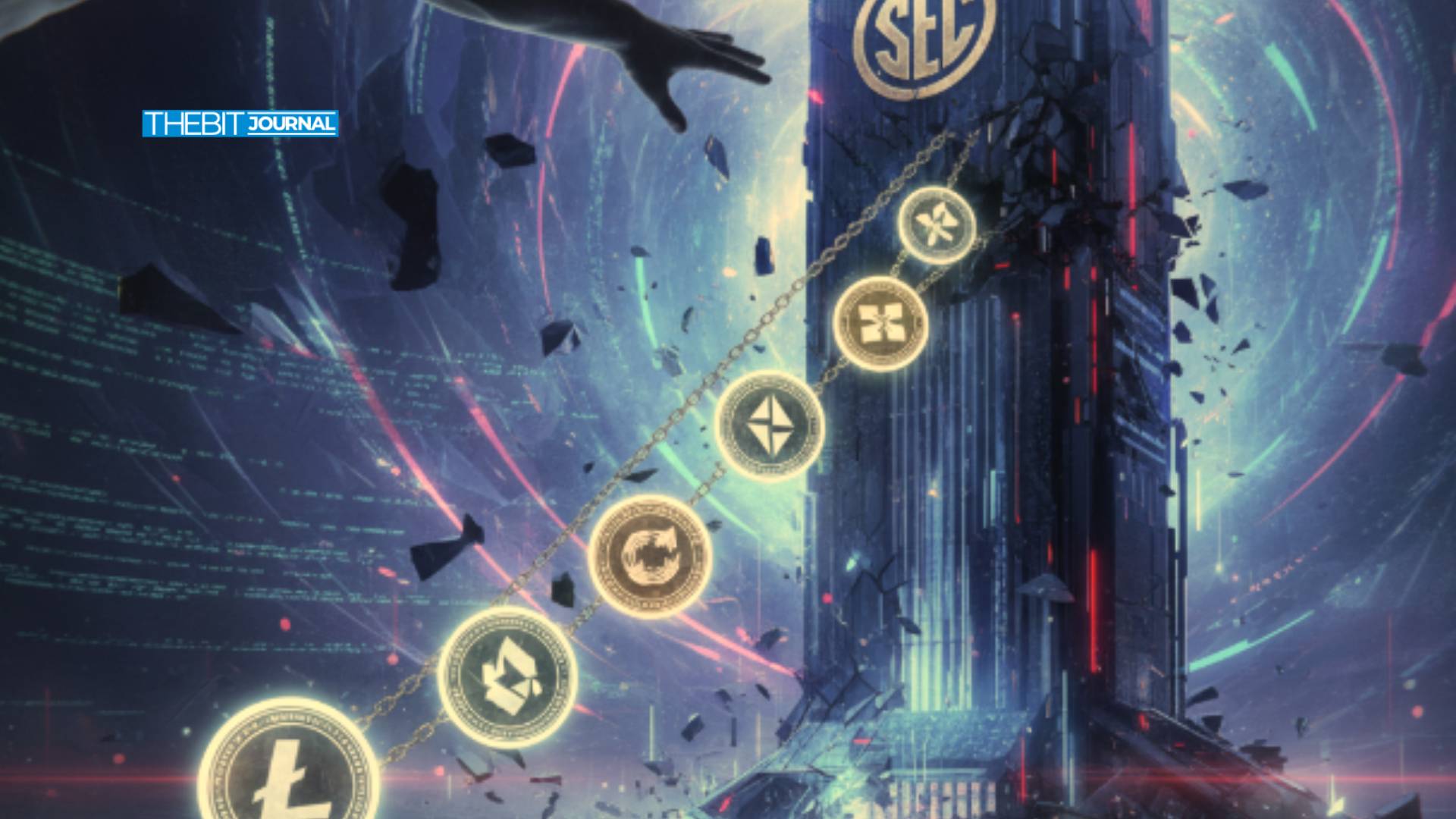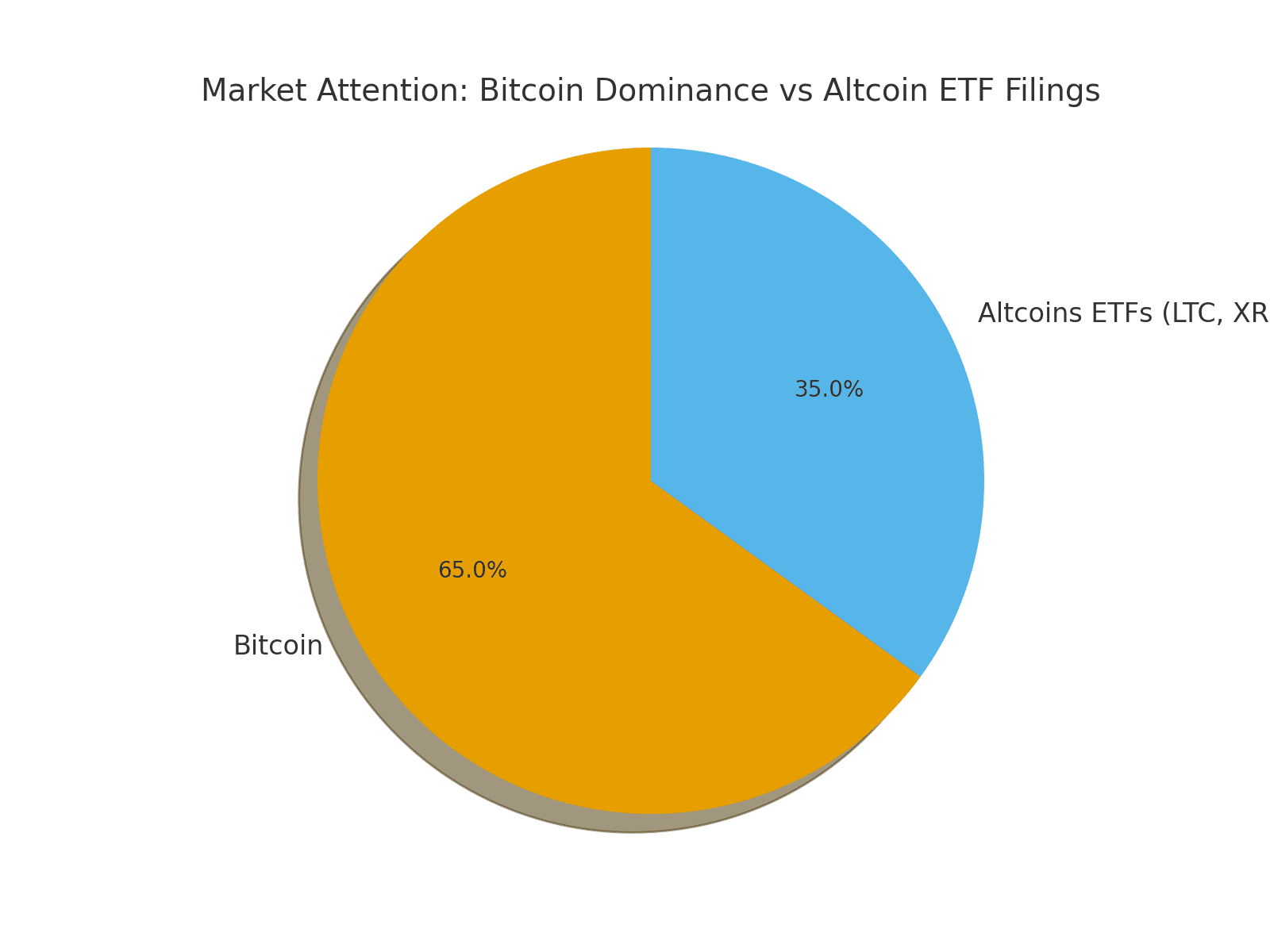SEC Hits Reset: Why XRP, Solana, Cardano, Dogecoin, and Litecoin ETF Filings Were Pulled
0
0

The U.S. Securities and Exchange Commission (SEC) has urged issuers of proposed spot ETFs tied to Litecoin (LTC), XRP, Solana (SOL), Cardano (ADA), and Dogecoin (DOGE) to pull their pending Form 19b-4 filings. This isn’t a rejection, it’s a procedural reset. By doing so, the SEC intends to usher in a streamlined system that cuts months of red tape.
This shift stems from the SEC’s recent approval of generic listing standards, rules that allow exchanges to list eligible crypto ETFs automatically, rather than forcing each issuer into an individual case-by-case process.
The 19b-4 requirement, under the old regime, was the legal lever exchanges used to propose amendments to listing rules. That step, now often redundant under the new framework, is being quietly eliminated.
Eleanor Terrett, reporting from X, captured the moment crisply: “The @SECGov has asked issuers of $LTC, $XRP, $SOL, $ADA, and $DOGE ETFs to withdraw their 19b-4 filings … withdrawals could start happening as soon as this week.”
Why the Change Matters
Under the older system, each newtwo regulatory filings, one via a 19b-4 for the exchange rule change, and another under Form S-1 from the issuer. These back-to-back approvals often dragged on for nine months or more.

The new generic listing standard slashes that timetable. Approved crypto products meeting certain criteria might now get greenlit in as little as 75 days.
The SEC’s objective is clear: simplify the process while preserving guardrails. According to public commentary, a token is eligible under the new regime if it meets at least one of the following criteria:
-
It is already traded on a regulated exchange.
-
It has futures contracts regulated by the CFTC for at least six months.
-
It is part of another ETF that holds at least 40% of its assets directly in that crypto.
Grayscale’s Digital Large Cap Fund (GDLC), covering BTC, ETH, XRP, SOL, and ADA, became the first multi-crypto ETF approved under the new rules.
Deadlines, Pressures and Market Reactions
Some issuers had key decision deadlines looming in October and November under the old 19b-4 schedule. With that path scrapped, timing depends now on S-1 review and internal corporate finance decisions.
Kyle DaCruz, director of digital assets at VanEck, said: “Not all of our existing filings qualify … Next step is to talk to our lawyers to see which products can move forward.”
Meanwhile, optimism runs high among analysts. Bloomberg’s Eric Balchunas suggested the odds of XRP or Solana ETFs being approved by year-end are now extremely high.
Even so, some caution is warranted. A government shutdown or regulatory slowdowns could muddy the rollout timing.
What Investors Should Watch
-
S-1 updates from issuers: Watch for refreshed filings tailored to the new framework.
-
SEC corporate finance signals: Approval may hinge on how quickly internal teams act.
-
ETF flow for GDLC and new products: Early inflows or outflows could set tone for altcoin funds.
-
Broader regulation: The SEC and CFTC plan to coordinate via a joint roundtable to harmonize crypto asset oversight.
In short: the playing field just changed.
Conclusion
This isn’t regulatory rejection, it’s a procedural rewrite. By asking issuers to withdraw 19b-4 filings, the SEC is signaling that the old roadblocks are no longer necessary under the new generic listing standards.
That paves a faster path for crypto ETFs tied to LTC, XRP, SOL, ADA, and DOGE, if issuers adapt quickly. Markets will be watching whether the shift produces a wave of ETF launches, or whether hidden complications still slow the process. For crypto investors, the next weeks may define how broadly and fast altcoin ETFs find their footing in the U.S.
FAQs
Q1: Does this withdrawal mean the SEC is rejecting altcoin ETFs?
No. The withdrawal is procedural. The SEC is replacing the old 19b-4 path with a generic listing standard that makes separate filings unnecessary.
Q2: Which tokens qualify under the new generic rules?
Tokens that trade on regulated exchanges, or have CFTC-regulated futures, or are held significantly in existing ETFs may qualify.
Q3: How fast can approvals move now?
Some issuers estimate down to 75 days, versus prior nine-month timelines.
Q4: Could this change delay ETF launches?
Yes, though the intent is acceleration, internal delays, regulatory capacity, or political issues could still cause hiccups.
Glossary of Key Terms
ETF (Exchange-Traded Fund): A fund traded on exchanges that holds assets (e.g., crypto, stocks).
Form 19b-4: A filing exchanges submit to the SEC to propose rule changes (historically required for new ETF listings).
Form S-1: A registration document issuers submit to disclose financials, risks, and structure.
Generic Listing Standards: Predefined rules enabling certain products to get listed automatically if they meet eligibility criteria.
CFTC: The U.S. Commodity Futures Trading Commission, whose oversight includes regulated derivatives and futures.
Read More: SEC Hits Reset: Why XRP, Solana, Cardano, Dogecoin, and Litecoin ETF Filings Were Pulled">SEC Hits Reset: Why XRP, Solana, Cardano, Dogecoin, and Litecoin ETF Filings Were Pulled
0
0
 Manage all your crypto, NFT and DeFi from one place
Manage all your crypto, NFT and DeFi from one placeSecurely connect the portfolio you’re using to start.







